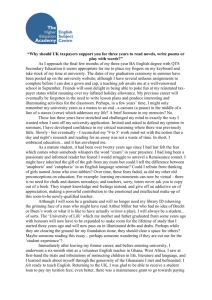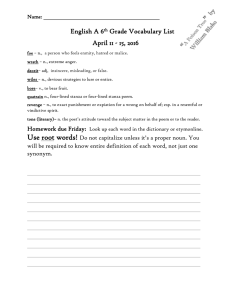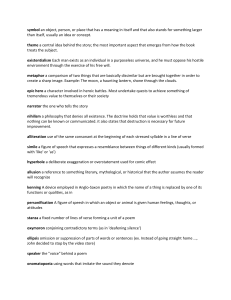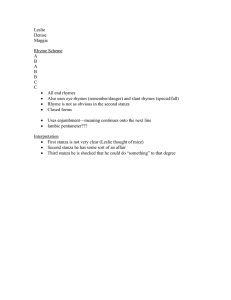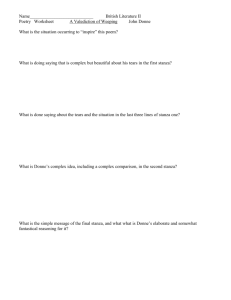Bradstreet notes (1)
advertisement
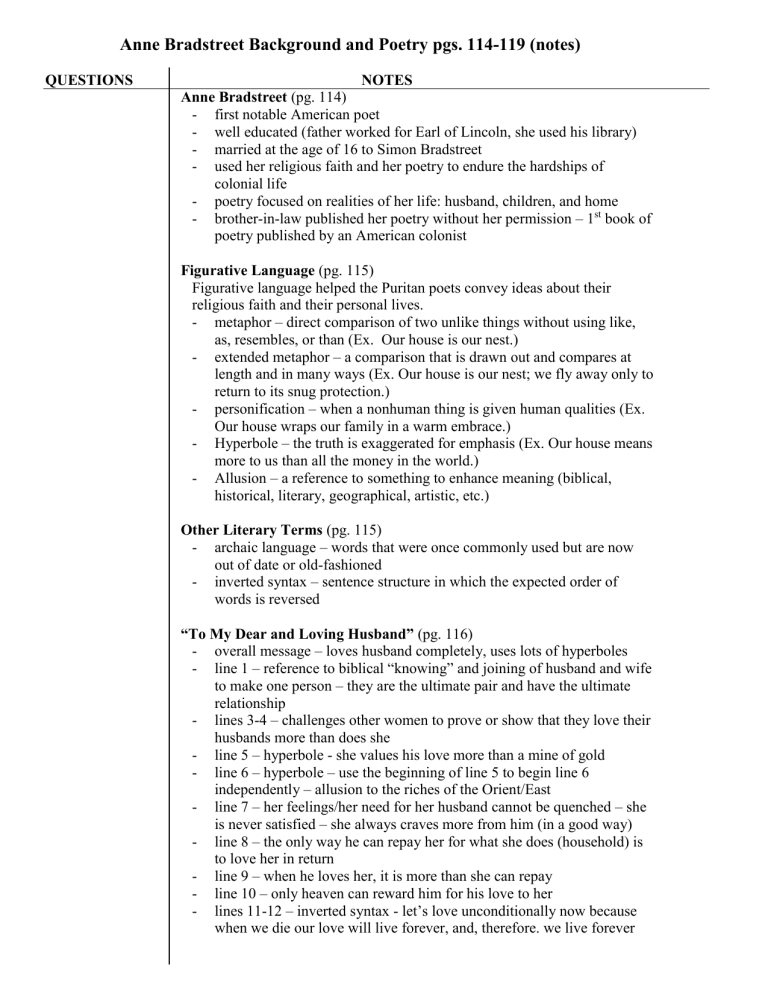
Anne Bradstreet Background and Poetry pgs. 114-119 (notes) QUESTIONS NOTES Anne Bradstreet (pg. 114) - first notable American poet - well educated (father worked for Earl of Lincoln, she used his library) - married at the age of 16 to Simon Bradstreet - used her religious faith and her poetry to endure the hardships of colonial life - poetry focused on realities of her life: husband, children, and home - brother-in-law published her poetry without her permission – 1st book of poetry published by an American colonist Figurative Language (pg. 115) Figurative language helped the Puritan poets convey ideas about their religious faith and their personal lives. - metaphor – direct comparison of two unlike things without using like, as, resembles, or than (Ex. Our house is our nest.) - extended metaphor – a comparison that is drawn out and compares at length and in many ways (Ex. Our house is our nest; we fly away only to return to its snug protection.) - personification – when a nonhuman thing is given human qualities (Ex. Our house wraps our family in a warm embrace.) - Hyperbole – the truth is exaggerated for emphasis (Ex. Our house means more to us than all the money in the world.) - Allusion – a reference to something to enhance meaning (biblical, historical, literary, geographical, artistic, etc.) Other Literary Terms (pg. 115) - archaic language – words that were once commonly used but are now out of date or old-fashioned - inverted syntax – sentence structure in which the expected order of words is reversed “To My Dear and Loving Husband” (pg. 116) - overall message – loves husband completely, uses lots of hyperboles - line 1 – reference to biblical “knowing” and joining of husband and wife to make one person – they are the ultimate pair and have the ultimate relationship - lines 3-4 – challenges other women to prove or show that they love their husbands more than does she - line 5 – hyperbole - she values his love more than a mine of gold - line 6 – hyperbole – use the beginning of line 5 to begin line 6 independently – allusion to the riches of the Orient/East - line 7 – her feelings/her need for her husband cannot be quenched – she is never satisfied – she always craves more from him (in a good way) - line 8 – the only way he can repay her for what she does (household) is to love her in return - line 9 – when he loves her, it is more than she can repay - line 10 – only heaven can reward him for his love to her - lines 11-12 – inverted syntax - let’s love unconditionally now because when we die our love will live forever, and, therefore. we live forever QUESTIONS NOTES “Upon the Burning of Our House, July 10, 1666” (pgs. 118-119) - overall message – God gives and can take away; apparently He had a reason to take away Bradstreet’s home/earthly possessions (too materialistic?) - inverted syntax – lines 1, 2, 3, 5-6, 7, 8, 21, 22, 23, 24, 27, 28, 29, 30, 37, 40, 42, 43, 53 *some might have been missed* - archaic language – line 3 (wakened), lines 7 and 23 (spy), line 10 (succorless), lines 11 and 28 (beheld/behold), line 14 (blest), line 16 (‘twas), line 18 (repine), line 19 (bereft), lines 21 and 24 (oft), line 22 (aside), lines 26 and 52 (store), lines 28, 29, 31, 33, 34, and 35 (shall/shalt), lines 29, 30, 33, 38, 39, 41, 43 and 50 (thy/thou/thee/thine), line 34 (bridegroom), line 37 (chide), line 38 (abide), line 39 and 40 (didst), line 42 (dunghill), line 43 (hast), line 48 (hath), line 52 (pelf), line 52 (farwell) *some might have been missed* Stanza 1 (lines 1-6) - She woke up in the middle of the night and found her house burning. - The sounds of the fire and someone screaming “fire” woke her. - Lines 5 – 6 – she seems to want her house to burn down (??) Stanza 2 (lines 7-12) - almost a complete repeat of stanza 1 - cries to her God to not leave her (lines 8 – 10) - leaves her house and watches it burn Stanza 3 (lines 13-18) - turns her back when she can’t watch it anymore - she prays to God, blesses Him for giving and taking away her things (lines 14-15) - she realizes that she shouldn’t complain – not her things (lines 16-18) Stanza 4 (lines 19-24), stanza 5 (lines 25-30), and stanza 6 (lines 31-36) - God took what He thought she could live without and left her enough to live (lines 19-20) - She often walks by the burned house (lines 21-22) and mourns her lost items (lines 23-36) - says goodbye to her house (line 36) - realizes all of her things are vanity (line 36) Stanza 7 (lines 37-42) - corrects herself angrily (lines 37-39) - tells herself to think about heaven and not her earthly possessions – refers to them as “dunghill” or poop (lines 41-42) Stanza 8 (lines 43-48) and stanza 9 (lines 49-54) - alludes to heaven and God’s plans for her in heaven (lines 43-46) - allusion to crucifixion (price for her home in heaven) (lines 47-50) - she realizes she has enough and needs nothing else (lines 51-52) - challenges herself to look to heaven where her “hope and treasure lies” (lines 53-54) SUMMARY
